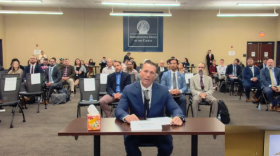The president of the Kentucky Chamber of Commerce says opioid abuse is taking a toll on the state’s economic growth and development. David Adkisson says illicit drug use is a factor in the state’s low workforce participation rate.
"Many people actively looking for work can't pass a drug test required for employment and many of those who do have jobs are exiting the workforce due to untreated or under-treated addictions," Adkisson says.
Because of those challenges, Adkisson says prevention and treatment must be a top priority for the state. He says opioid abuse threatens Kentucky’s ability to retain and attract business investment.
"If we were simply at the national average, there would be 165,000 more workers in the Kentucky economy than there are today," Adkisson says. "Opioid addiction is one of the contributing factors to that, but it's a significant factor."
Earlier this year, the General Assembly passed legislation to drive down the number of opioids prescribed. The law prevents doctors from prescribing more than a three-day supply of painkillers, with some exceptions. The measure also increased penalties for trafficking in opioids.
The Kentucky Office of Drug Control Policy says more than 1,400 Kentuckians died from drug overdoses last year, a 7 percent increase from the previous year.
The federal Substance Abuse and Mental Health Services Administration conducts an annual survey that measures illicit drug use among states. The most recent results show 410,000 Kentuckians over the age of 18 have used marijuana in the past year, 56,000 have used cocaine, and 19,000 admitted to heroin use.





